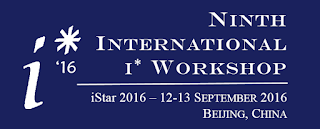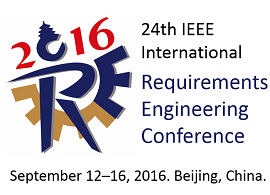The workshop will be co-located to the 29th International Conference on Advanced Information Systems Engineering (CAiSE'17).
Sunday, December 4, 2016
iStar 2017 workshop at CAiSE
This year I'm organising the International Workshop of i* jointly to Lin Liu and Sepideh Ghanavati. You can find the workshop details at iStar17 website.
Tuesday, November 1, 2016
Q-Rapids European Research Project starts
Q-Rapids: Quality-aware rapid software development
H2020 (H2020-ICT-2016-1, Software Technologies)
The 3-year Q-Rapids defines an empirical-based, data-driven quality-aware rapid software development methodology.
Quality Requirements (QRs) are incrementally elicited and refined based on data gathered both during development and at runtime. This data is elaborated into quality-related key indicators presented to decision makers through a strategic dashboard with advanced capabilities. Selected QRs are integrated with functional requirements for their unified treatment in the rapid software development process.
More information at www.q-rapids.eu
Wednesday, September 7, 2016
Today arrived a printed copy of my first book chapter
Surprisingly, yesterday arrived a printed copy of my first book chapter. I'm not sure who send it to me, so I don't know who to thank you.
The i* framework for goal-oriented modeling
Xavier Franch, Lidia Lopez, Carlos Cares and Daniel Colomer
Abstract. i* is a widespread framework in the software engineering field that supports goal-oriented modeling of socio-technical systems and organizations. At its heart lies a language offering concepts such as actor, dependency, goal and decomposition. i* models resemble a network of interconnected, autonomous, collaborative and dependable strategic actors. Around this language, several analysis techniques have emerged, e.g. goal satisfaction analysis and metrics computation. In this work, we present a consolidated version of the i* language based on the most adopted versions of the language. We define the main constructs of the language and we articulate them in the form of a metamodel. Then, we implement this version and a concrete technique, goal satisfaction analys is based on goal propagation, using ADOxx. Throughout the chapter, we used an example based on open source software adoption to illustrate the concepts and test the implementation.
ISBN: 978-3-319-39416-9 (Print) 978-3-319-39417-6 (Online)
The final publication is available at Springer via http://dx.doi.org/10.1007/978-3-319-39417-6
Sunday, July 24, 2016
Three papers accepted in the i* International Workshop (iStar 2016)
An Empirical Evaluation Roadmap for iStar 2.0
Lidia López, Fatma Başak Aydemir, Fabiano Dalpiaz and Jennifer Horkoff
Towards iStarML 2.0: Closing Gaps from Evolved Requirements
Carlos Cares and Lidia López
iStarJSON: A Lightweight Data-Format for i* Models
Oscar Franco-Bedoya, David Ameller, Dolors Costal and Lidia López
Tuesday, June 28, 2016
Paper accepted in the Information Systems Journal (my first Q1!!!!!!!!)
Friday, April 29, 2016
WER2016 is over, we will see you at WER 2017
Thanks to all the authors for choosing WER 2016, we had a good time in Quito.
Congratulations to the best paper authors.
Congratulations to the best paper authors.
Monday, February 22, 2016
iStar Workshop accepted at RE 2016
This year I'm organising the International Workshop of i* jointly to Yijun Yu. You can find the workshop details at iStar16 website.
The workshop will be in-conjunction with the 24th International Requirements Engineering Conference (RE 2016).
The workshop will be in-conjunction with the 24th International Requirements Engineering Conference (RE 2016).
Tuesday, February 16, 2016
Paper accepted at 28th International Conference on Advance Information Systems Engineering (CAiSE 2016)
OSSAP - a Situational Method for Defining Open Source Software Adoption Processes
Lidia López, Dolors Costal,Jolita Ralyté,Xavier Franch, Lucía Méndez, Maria Carmela Annosi
Abstract Organizations are increasingly becoming Open Source Software (OSS) adopters, either as a result of a strategic decision or just as a consequence of some techno-logical choices. The strategy followed to adopt OSS shapes organizations’ busi-nesses; therefore methods to assess such impact are needed. In this paper, we propose OSSAP, a method for defining OSS Adoption business Processes that has been built using a Situational Method Engineering (SME) approach. We use SME to combine two well-known modelling methods, namely goal-oriented models (using i*) and business process models (using BPMN), with a pre-existing catalogue of goal-oriented OSS adoption strategy models. First, we de-fine a repository of reusable method chunks, including the guidelines to apply them. Then, we define OSSAP as a composition of those method chunks to help organizations to improve their business processes in order to integrate the best fit-ting OSS adoption strategy. The approach is illustrated with an example of appli-cation in a big telecommunications company.
Wednesday, February 10, 2016
Papers selected for WER 2016
We already select the papers to be presented at WER 2016. From the 46 submitted papers, after a fruitfull period of discussion, we finally select 12 paper as full papers, and 3 that will be presented as short papers.
Thanks to all the authors for choosing WER 2016 to submit their work.
See you soon in Quito.
Thanks to all the authors for choosing WER 2016 to submit their work.
See you soon in Quito.
Monday, January 18, 2016
RISCOSS Project has ended
After 3 and something years working on RISCOSS, the project have arrived to its end. I really enjoyed the path and I expect that the RISCOSS results prevail after this ending.
Some of you already know what this project is about, I can be a bit nuisance sometimes, I hope not too much :). RISCOSS analyses Open Source projects in order to assess about the risks of adopting this kind of software. The assessment is based mainly in information that is gathered from the project repositories (github, gitlab,...), mailing list (markmail,...), bug trackers (Jira,..) or even external tools that already gather some information from Open Source projects (sonar, olex, fossology,...).
If you have, are using or want to use an Open Source project hosted at github, you can try a basic analysis at:
 If you try RISCOSS, please fill the feedback questionnaire, using the Feedback menu option, it won't takes more than 2 minutes.
If you try RISCOSS, please fill the feedback questionnaire, using the Feedback menu option, it won't takes more than 2 minutes.
We are an OSS project too, so, you can find us at https://github.com/RISCOSS. We will continue working on it, and we would be glad if you can join us as a community member for working together. You can also help us trying the public deployment (RISCOSS github analyser/), giving us some feedback (Feedback menu option) or simply adding some issue in the github repository with your suggestions (https://github.com/RISCOSS/riscoss-corporate).
The full version allows to configure the kind of analysis you can do, you can contact us sending me a mail or through our website www.riscoss.eu.
Some of you already know what this project is about, I can be a bit nuisance sometimes, I hope not too much :). RISCOSS analyses Open Source projects in order to assess about the risks of adopting this kind of software. The assessment is based mainly in information that is gathered from the project repositories (github, gitlab,...), mailing list (markmail,...), bug trackers (Jira,..) or even external tools that already gather some information from Open Source projects (sonar, olex, fossology,...).
If you have, are using or want to use an Open Source project hosted at github, you can try a basic analysis at:
We are an OSS project too, so, you can find us at https://github.com/RISCOSS. We will continue working on it, and we would be glad if you can join us as a community member for working together. You can also help us trying the public deployment (RISCOSS github analyser/), giving us some feedback (Feedback menu option) or simply adding some issue in the github repository with your suggestions (https://github.com/RISCOSS/riscoss-corporate).
The full version allows to configure the kind of analysis you can do, you can contact us sending me a mail or through our website www.riscoss.eu.
Subscribe to:
Posts (Atom)










